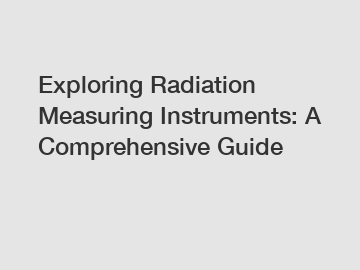Feb. 09, 2024
Machinery
Exploring Radiation Measuring Instruments: A Comprehensive Guide.
Radiation measuring instruments play a critical role in various fields, including nuclear power plants, medical technology, and environmental research. These instruments are designed to measure and quantify the presence of radiation in different forms, ensuring the safety of humans, animals, and the environment. In this comprehensive guide, we will delve into the world of radiation measuring instruments, exploring their types, applications, and key features. Let's get started!
Types of Radiation Measuring Instruments.

1. Geiger-Muller Counters:
The Geiger-Muller (GM) counter is one of the most commonly used radiation measuring instruments. It provides a simple and quick method for detecting different types of radiation, such as alpha, beta, and gamma particles. These portable devices are widely used in nuclear power plants, laboratories, and radiology departments.
2. Scintillation Detectors:
Scintillation detectors are sophisticated instruments that use special crystalline materials to convert radiation into light pulses. These detectors are highly sensitive and can differentiate between different types of radiation. They are commonly used in medical imaging, environmental monitoring, and nuclear physics research.
3. Ionization Chambers:
Ionization chambers measure the amount of ionization caused by radiation using electrically charged chambers filled with gas. They are widely used for measuring external exposure to radiation in occupational and medical environments. Ionization chambers are commonly found in radiation therapy departments and X-ray facilities.
4. Solid-State Detectors:
Solid-state detectors use semiconductor materials to measure radiation by detecting the electrical charge produced when radiation passes through the material. These detectors are commonly used in nuclear medicine, industrial applications, and space exploration.
Applications of Radiation Measuring Instruments.
1. Nuclear Power Plants:
Radiation measuring instruments are crucial in nuclear power plants to monitor radiation levels and ensure the safety of workers and the environment. Continuous monitoring helps detect any abnormal increase in radiation levels, allowing prompt actions to be taken to prevent any potential risks.
2. Medical Technology:
In the field of medicine, radiation measuring instruments are used for radiation therapy treatments, nuclear medicine procedures, and diagnostic imaging. These instruments help in delivering precise doses of radiation to patients, ensuring effective treatment while minimizing radiation exposure.
3. Environmental Research:
Radiation measuring instruments are used to monitor radiation levels in the environment, ensuring the safety of ecosystems and human populations. They help identify areas contaminated with radiation, enabling effective management and cleanup strategies.
Key Features to Consider.
1. Sensitivity:
The sensitivity of the instrument determines its capability to detect and measure low levels of radiation accurately. Higher sensitivity allows for the detection of even the smallest changes in radiation levels.
2. Range:
Consider the instrument's measurement range to ensure it is suitable for the intended application. Some instruments are designed for high radiation environments, while others are better suited for low radiation levels.
3. Durability and Portability:
Depending on the application, consider the durability and portability of the instrument. Some instruments are handheld and rugged, while others are benchtop models for stationary measurements.
Closing Thoughts.
Exploring radiation measuring instruments is crucial in understanding their significant role in various fields. Whether it's ensuring the safety of workers in nuclear power plants, providing precise radiation therapy treatments, or monitoring environmental radiation levels, these instruments are indispensable. When considering purchasing a radiation measuring instrument, make sure to research and analyze the features that will best suit your specific needs. If you have any further questions or need assistance in choosing the right instrument, please do not hesitate to contact us.
Contact Us: [Include contact information here].
For more I-131 radiotherapy, radiation monitoring system on UAV, acousto-optic q-switch driverinformation, please contact us. We will provide professional answers.
Previous: How thick can a 2000 watt laser cut?
Next: Which is the best method to clean a circuit board for a flawless purchase experience?
If you are interested in sending in a Guest Blogger Submission,welcome to write for us!
All Comments ( 0 )